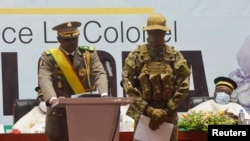Weakened by security and economic crises and criticised for their failure to transfer power back to civilians, Mali's authorities have cracked down on mounting dissent, while still managing to retain support from a section of the population.
The West African nation has been ruled by juntas since back-to-back coups in 2020 and 2021, with the military promising to hand back power through the ballot box in February under pressure from regional bloc ECOWAS.
But the colonels sparked domestic and international criticism after failing to uphold this commitment and postponing the election until an unspecified date -- citing a precarious security situation aggravated by jihadist groups which has not yet been stabilized.
After muzzling opponents, journalists and human rights activists, the military authorities suspended the activities of political parties in April and dissolved several civil society organisations calling for elections to be held.
But in the eyes of some Malians, the increasingly critical political class "suffers from a credibility deficit due to corruption and broken promises" under previous regimes, said Mahamadou Konate, a university professor in the capital Bamako.
He added that this view had been amplified by communications from the military government.
The junta is also counting on the inter-Malian dialogue, launched in December, to strengthen its peace efforts after ending a major 2015 deal with armed separatist groups in the north.
The talks' first recommendations, seen by AFP, unsurprisingly call for the extension of the so-called "transition" period and, in some regions, for junta leader Colonel Assimi Goita to stand as a candidate in the presidential election.
'Resilience'
The "dialogue" has been boycotted by the majority of the opposition, which sees it as a pretext for the regime to prolong its rule.
But a fringe of public opinion "believes that elections would not be a guarantee of development or any kind of relief, and sees no urgency in them," Aly Tounkara, Executive Director of the Centre for Security and Strategic Studies in the Sahel, told AFP.
Despite the dissent of a section of the political class, joined by the now-banned coalition of supporters of the influential imam Mahmoud Dicko, the regime has not witnessed any major popular protests.
In January, more than nine out of 10 Malians said they were still satisfied with the way the transition was being managed, according to an opinion survey conducted by the German Friedrich Ebert Foundation, mainly in major urban centres and against a backdrop of repression of dissenting voices.
While violence continued to increase in rural areas until the end of 2023 according to the latest available statistics, most major cities have experienced a relative lull since the colonels came to power.
The arrival of Russian and Turkish military equipment has reinforced "the perception that the military have a real desire to tackle what Malians consider to be the number one priority: security," said Ibrahim Maiga, an analyst with the NGO International Crisis Group.
The junta's nationalist rhetoric, coupled with its rupture with former colonial power France in favour of Russia, as well as its gains over armed separatist groups, helps to "keep alive a political and popular consciousness" encapsulating a form of "resilience," Maiga added.
'No alternative'
"The discontent is much greater than we think, but the means of expression are very limited," Maiga said.
He added that continuous power cuts affecting many Malians, who are already sweltering under intense heat, "are in the process of eroding" public support for the junta in urban areas.
"The people are gradually waking up, but they have the impression that there is no alternative," Konate said.
"It is difficult to find unifying personalities, hence the feeling of being faced with an empty field," added Tounkara.












Forum